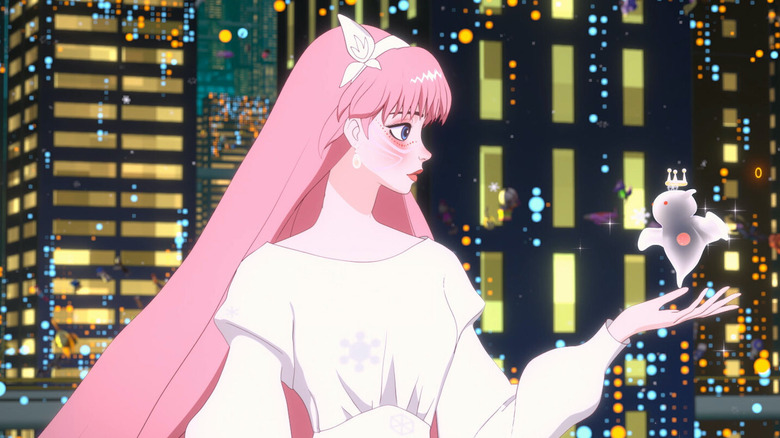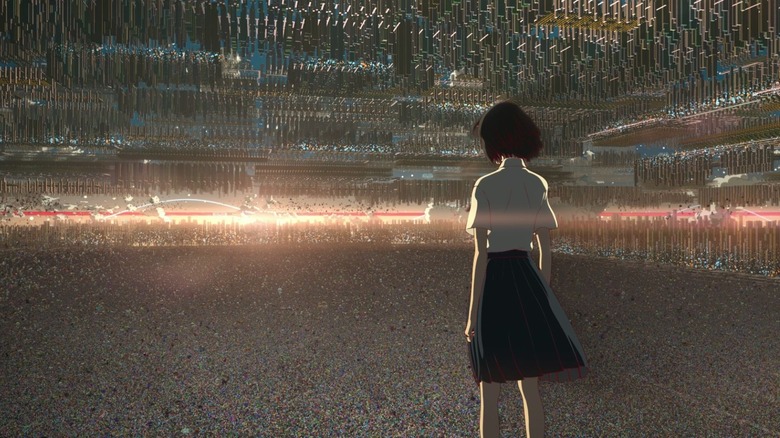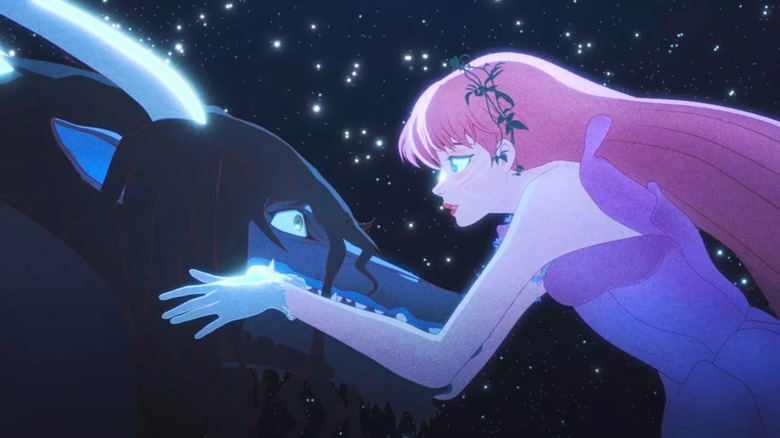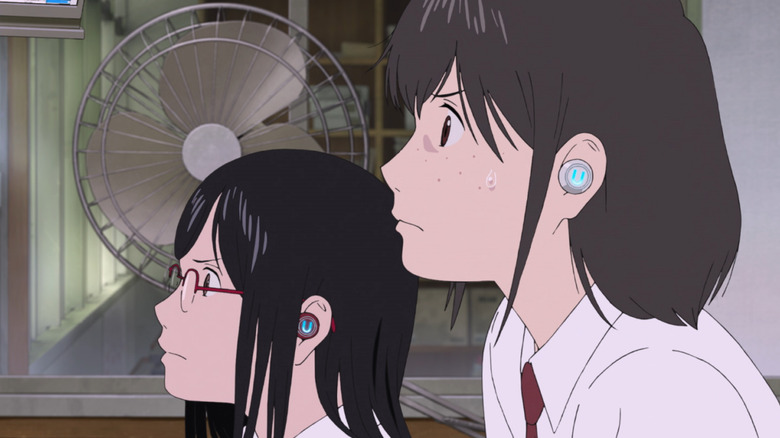Belle Review: A Tale As Old As Time Is Given A Dazzling Digital Reskin
It's a tale, well, as old as time. Girl meets boy, girl and boy fall in love, girl and boy live happily ever after. But in "Belle," Mamoru Hosoda's digital reimagining of the classic French fairy tale "Beauty and the Beast," that's not quite the case.
The words "digital reimagining of 'Beauty and the Beast'" might elicit an immediate gag reflex. Especially when that digital reimagining takes place in a virtual-reality world where our protagonist is a beloved musical diva who holds regular spectacle-filled concerts. But before you immediately write off "Belle," Mamoru Hosoda's deeply moving treatise to love and connection in an extremely online world, let me make the case for one of the best animated movies of the year (and last year — though it's hitting U.S. theaters today, the film was released in Japan in 2021).
A Place for U
Suzu Naito is a 17-year-old high school student with a secret: she's actually the beloved musical star "Belle," the most popular avatar in the virtual-reality world known as "U." Belle is everything Suzu is not — beautiful, confident, and loved for her strange songs that appear to resonate with everyone in U. But more than just a secret identity for Suzu, Belle is an outlet for the teenager, who suffered a shattering loss when she was young. While out swimming by the river with her mom, a child got caught in a strong current and was beginning to get pulled underwater. Her mom immediately jumped to save her, despite Suzu's pleas for her to stay, and drowned in the process of saving the child. Since then, Suzu withdrew from life, giving her dad, with whom she had never been close, the cold shoulder and resenting her mom for "abandoning" her for a stranger's child. But worst of all, she lost her ability to sing. When she was young, she and her mom would always sing together and create songs, but after her mom died, it was as if a light went out in her life. But somehow, that light is reignited when she receives an invite to U.
With someone else's face and a new identity, Suzu is able to temporarily shed all her baggage and finally sing. And miraculously, her singing starts to bring joy to other people. Soon, she becomes the most popular singer in U and, with the help of her best friend and tech genius Hiroka, she remakes herself into a glamorous diva. But when one of her concerts is interrupted by a beastly avatar known as "The Dragon," she becomes involved in a tense plot to unveil the identity of the scarred fighter whom the guardians of U deem a threat to the peace.
It's not exactly the plot to "Beauty and the Beast," but the hallmarks of the fairy tale are all there: the sympathetic beauty, the misunderstood beast, the dilapidated castle in which The Dragon takes shelter. But the thing missing from "Belle" is romance, at least in the traditional sense. Suzu finds herself fascinated with The Dragon, but not for the reasons that you'd expect from a "Beauty and the Beast" retelling. Rather, she recognizes in his eyes a fellow wounded soul, and seeks him out, only to be pushed away by the angry avatar, who accuses her of only being kind to him out of pity.
More Than One Kind of Love Story
There are many different shades to love. There's familial love, there's romantic love, there's platonic love, there's toxic love, there's codependent love. But the one that we most often see on the big screen, in all its glittering glory, is romantic love. And why wouldn't we? Nothing beats the euphoria of watching two beautiful people fall head over heels in love, riding off into the sunset.
But "Belle" deals with a type of love that we rarely see on film in Hollywood — a pure, unconditional love for strangers. It sounds like pity, or empathy, or even romance in a way, but it's something in between of all of those. That's the kind of love that starts to grow in Suzu as she learns more about The Dragon, who saves her in U several times before she realizes that he's the one that needs saving. With Hiroka's help, she discovers the dark truth behind The Dragon's digital scars, and the feral anger that seems to possess him. The revelation brings "Belle" into a more mature territory than most animated films would dare to tread. But it's only a natural evolution for Hosoda, who has explored deeper emotional territory in his more recent films like "Wolf Children" and "Mirai," marrying it with his joyous view of our more digitized society that he showed in "Summer Wars," and of course, "Digimon."
Digital Connections
That's what makes "Belle" such a remarkable depiction of the digital world. It's the counterpart to the angry, frightening portrayals of the internet as a cold, alienating, harsh place in films like "Kairo" or ugly, cynical ones like "Ready Player One." It's about the miracle of finding a connection and the strength one can get from showing decency to others. Not to mention it's gorgeous: the background work created by Cartoon Saloon of "Wolfwalkers" fame is absolutely breathtaking, filling each frame with towering skyscrapers and multicolored buildings that feel like a combination of the trippy dreamworld seen in Satoshi Kon's "Paprika" and the bright bustle of Hosoda's own "Summer Wars." The character animation is perhaps the biggest departure from Hosoda's past works, with Belle specifically given a more Disneyfied look courtesy of veteran Disney animator and character designer Jin Kim and Michael Camacho. But it helps create the divide between Suzu's rural reality — still retaining those soft, vague shapes that I love in Hosoda's films — and the cartoonishly heightened virtual U.
"Belle" is the least like anything Hosoda has ever done — tense and high-stakes where most of his films are beautifully low-key, and the first film to not be an intensely personal metaphor for his own life. But it is still as deeply felt and emotionally delicate as Hosoda's best films, even as it clearly aspires to be his most mainstream work. Still, there's something daring about how it refuses to give into our expectations about love, romance, and our digital realities. Hosoda has managed to take that time-honored tale, and turn it into an ode to the connection in the time of the internet.
/Film Rating: 8.5 out of 10



